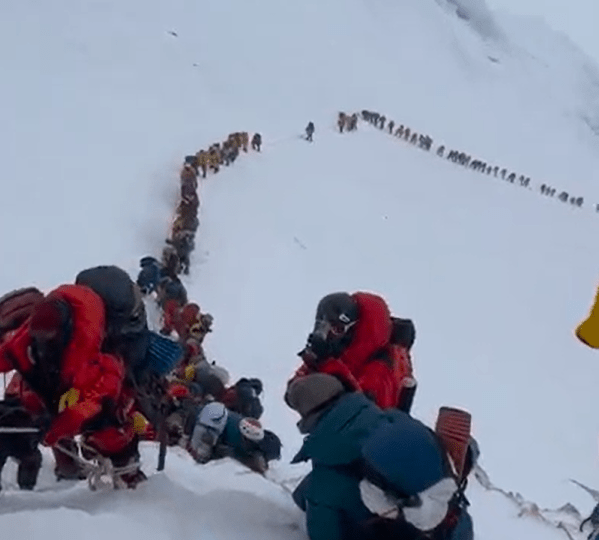MASSIVE queues up the world’s biggest mountain could have led to the disappearance of a Brit climber, it has been claimed.
Footage appears to show hundreds of climbers slowly making their way up the Hillary Step, a nearly vertical rock face near the top of Mount Everest at around 26,000 feet.
@everester.raj / InstagramHundreds of climbers can be seen making a painfully slow way up the Everest[/caption]
X / @interesting_allWhile others were left stranded after an ice cornice collapsed[/caption]
Instagram / @danpatwcfBrit climber Daniel, 40, is feared dead after vanishing when going up Mount Everest[/caption]
Experts fear the painfully overcrowded queues may have caused the collapse of a cornice, which led to the disappearance of Daniel Paterson, 40, and his Nepalese guide Pastenji Sherpa, 23.
The pair are now feared dead as they have not been heard from since reaching the summit at around 4.40am on Tuesday.
The cornice, which is a mass of frozen snow that hangs over a cliff, is thought to have crumbled and dragged some climbers down the mountainside, Sky News reports.
Daniel and his guide got into difficulties when ice fell on them close to the Hillary Step, says fellow Everest guide Lapka Sherpa.
They had “heroically” ascended to the summit of the world’s highest peak but they vanished on the way down.
Daniel shared much of his journey in the Himalayas on social media and revealed what it was like to climb the mountain.
A heart-wrenching last post on social media by the British climber now feared dead has revealed why he wanted to reach the top of the world.
The Leeds gym owner’s partner has since launched a GoFundMe to get specialist search and rescue.
An expert went on to reveal that four others “nearly perished” in the ice collapse on Tuesday.
Instagram / @danpatwcfDaniel shared much of his trip in the Himalayas on Instagram and revealed why he wanted to climb the mountain in a final post[/caption]
@everester.raj / InstagramThose up top would struggle to see the end of the long line down the peak[/caption]
Vinayak Malla, an accredited guide with the International Federation of Mountain Guides Associations, told Yahoo! News: “After summiting, we crossed the Hillary Step, traffic was moving slowly then suddenly a cornice collapsed a few metres ahead of us.
“As the cornice collapsed, four climbers nearly perished yet were clipped onto the rope and self-rescued.
“Sadly, two climbers are still missing. We tried to traverse yet it was impossible due to the traffic on the fixed line.”
Meanwhile, a member of a team at Everest base camp told The Times: “A cornice broke off and washed down a few climbers including Daniel and his guide towards the Tibet side.”
Overcrowding on the world’s biggest mountain is no news to experts and has become an increasing concern to officials in recent years.
With eight of the world’s fourteen peaks rising above 8,000 metres (26,246 feet), Nepal is a popular destination for hundreds of intrepid travellers each spring climbing season.
Only during the brief periods of clear weather and calm winds is it possible to ascend Mount Everest.
This has caused climbers to wait in bitter cold and deplete their precious oxygen supplies in lengthy lines at challenging sections.
As the Everest climbing season enters full swing, clips and pictures on social media now appear to show hundreds of climbers crammed up along the Hillary Step.
Indian explorer Rajan Dwivedi shared on Monday his views of a frantic push for camp 4 near the summit.
After ten years of planning his trip, Rajan revealed that he had “mixed feelings” after the climb.
He documented the painfully slow pace while filming the fixed ropes on Yellow Bands, so called because of the striped limestone steps on the Lhotse Face.
Rajan took to Instagram to show the hundreds of mountaineers in summit suits, roped in and going nowhere.
He wrote: “I saw many climbers in quite precarious situation hanging on the rope and their Sherpas struggling to pull them down.”
In an update on Tuesday, the Indian explorer described seeing climbers in a “sleepy/zombie state”.
“They were shaking and crying causing a traffic jam,” he said.
Earlier this month, Mongolian climbers Usukhjargal Tsedendamba, 53, and Purevsuren Lkhagvajav, 31, went missing on Everest.
The pair, who had not used sherpa guides, were discovered dead a week later at two separate locations after summiting the peak.
SuppliedPastenji Sherpa, 23 is also feared dead after missing alongside Daniel[/caption]
Instagram / @danpatwcfA fellow sherpa confirmed Daniel and his guide reached the top of the mountain before they went missing[/caption]
Instagram / @danpatwcfDaniel’s partner Becks has now launched a gofundme to fund a search and rescue operation[/caption]
What is Everest’s ‘death zone’?
Everest’s death zone is the area on the mountain above 26,000ft (8,000m) and where the pressure of oxygen is insufficient to keep someone alive.
There are 14 peaks above the 26,000ft height with each of them having a death zone.
All those peaks are found within the Himalaya and Karakoram mountain ranges.
More than 5,000 have scaled it since it was first climbed by New Zealander Edmund Hillary and Sherpa Tenzing Norgay in 1953, while hundreds more try every year.
But 350 people have died trying to climb the peak with many dying in the death zone.
Deaths above that 26,000ft altitude mark happen as the lack of oxygen makes climbers lose bodily functions or indirectly make poor decisions.
Other deaths have been caused by avalanches, falls, serac collapse, exposure, or frostbite.









